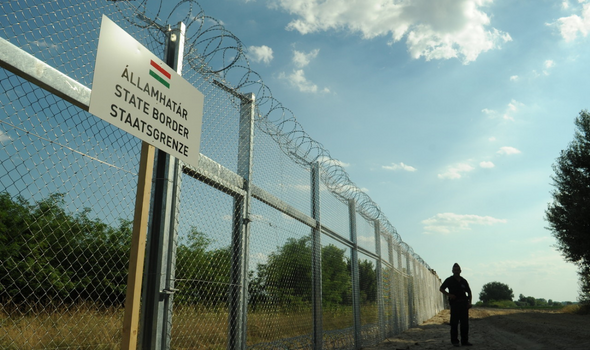Borderline injustice: The externalisation of borders
Borderline injustice: The externalisation of borders

Tuesday, 13 September 2022
Borders may be the cause of all the problems we are facing in British and European governments’ policies on immigration.
That comment set the ball rolling on a lively three-and-a-half-hour discussion organised by Migrant Voice in partnership with the University of Westminster on 8 September.
The topic was “The Externalisation of Borders” — how some countries shift some of their border controls to nearby countries (for example, wealthier European Union countries pressing and paying less prosperous European countries to take responsibility for controlling the borders of the EU) or to countries further afield (such as Britain paying Rwanda £120 million to take on asylum seekers).
More powerful, wealthier countries use both manoeuvres to prevent “unwanted” migrants, including people fleeing for their lives, from reaching their borders.
The questions for two panels and an audience of academics and activists were: How have borders developed in the last decades in Europe? What has been the impact on migrants? What are some solutions employed, and what role can we play?
Panellists included speakers from Amnesty UK, Right to Remain, Regularise, Migrants Organise, the Legal Clinic for Human Rights, United Against Inhumanity and the Migration Observatory, as well as the University of Tunis El Manar and the University of Granada.
“Borders and controlling borders cause harm,” one speaker said, including deaths, stress, family division and financial costs. But they are intimately tied to ideas of sovereignty and the nation state (“Borders are existential for how national states see themselves”). So there is little support for their abolition.
In any case, governments like the idea of transferring border controls elsewhere because any human rights abuses that take place outside a country’s territory are harder to scrutinise, and it is difficult to hold governments accountable for abuses and bad policies.
It’s about “invisibility”, said one participant, because it enables governments to avoid embarrassment at turning away desperate people.
“Governments have a lot to gain by externalising borders”, so it’s not surprising that the practice is growing. Panellists cited UK checks on asylum seekers in northern France, Italy financing Libyan coastguards — in reality, militias — to stop small boats carrying migrants across the Mediterranean, and Australia seizing asylum seekers on the open sea and incarcerating them in Papua New Guinea. (The meeting was held under the ‘Chatham House rule’, meaning statements cannot be attributed to speakers.)
Throughout the discussion it was pointed out that governments in the global north generally treat migration as an emergency, “but migration is not an emergency. It is a phenomenon that has been around since the beginning of civilisation”.
One participant said that the tactic of placing part of your border in another country began, insidiously, with loaded language: politicians speak of “addressing the root causes of migration” — which immediately defines migration as a problem, “and once you define it as a problem it’s ok for governments to spend money on it by externalising borders”.
Another speaker pointed to a parallel phenomenon: the internalisation of borders, by which members of the public are required to take on some of the responsibilities of border controls. They gave the example of the UK, where doctors, landlords and employers must check the immigration status of clients and patients. As well as a number of other effects, this fosters discrimination against ethnic and linguistic minorities, whether migrants or natives, and indeed against anyone deemed not to “fit in”.
Governments cannot be solely blamed for the current human rights abuses and harms that occur at externalised borders, one speaker insisted: there needs to be a global change in attitudes to migration and everyone has a role in contributing to create this change — which one participant said should include “fighting for mobility to be a human right, whatever a person’s financial position”.
There was recognition that it’s difficult for members of the public to influence governments, “largely because power has become so centralised in a few, sometimes one person’s, hands.
“Migration policymaking has become less democratic, but the [UK] government has put on quite a good show of consulting others — the illusion of a properly democratic process.”
Academics, it was suggested, should provide impartial and objective research; NGOs should base their campaigns on this data and coordinate their advocacy, “speaking as one, with as broad a base as possible”; individuals can exercise their right to vote, join organisations and networks and, perhaps most importantly, speak to other members of their community.
In the words of one speaker: “The main challenge is how we talk to people on the street and make them understand that the struggles they are themselves facing is linked to the struggle migrants and asylum seekers face in the ‘hostile environment’.”
Panellists:
- Lul Seyoum, Co-Chair, United Against Inhumanity (UAI) & Director, International Centre for Eritrean Refugees and Asylum Seekers (ICERAS)
- Steve Valdez-Symonds, Refugee and Migrant Rights Programme Director, Amnesty International UK
- Eiri Ohtani, Director, Right to Remain
- Rim Triki, University of Tunis El Manar
- Alice Argento, Legal Clinic for Human Rights (CLEDU)
- Donia Smaali Bouhlila, University of Tunis El Manar
- Nieves Ortega Perez, University of Granada
- Peter Walsh, the Migration Observatory
- Brian Dikoff, Migrants Organise
- A representative from Regularise
The event was organised in partnership with the University of Westminster as part of its Summer School programme.
The Summer School was carried out within the framework of Migrants Project, co-funded by the Erasmus + Programme of the European Union. Learn more about the project.
Photo credits: Délmagyarország/Schmidt Andrea, Wikimedia Commons


